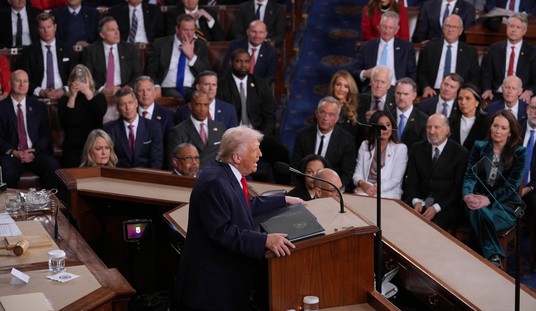Shane Jett is an Oklahoma state representative with an idea that he says would raise his state's profile, bring in more tourists and enrich the local economy. He wants to change the state flag by italicizing the state's name and adding an exclamation point. Thus: OKLAHOMA!

The suggestion doesn't seem to be making him a lot of friends. "People ask me if there aren't more important things for me to work on," Jett told The Tulsa World. Lawmakers from Ponca City, the home of the current flag's designer, say they oppose any change. An editorial in the World insisted that the banner, unlike just about everything else in this vale of tears, "needs no improvement."
In fact, Oklahoma's symbol has something in common with most of the other 49 state flags: It could use a great deal of improvement. A lot more care goes into designing the basketball uniforms at big public universities than went into designing what flies over those schools.
The Oklahoma flag is one of many that seemingly were all created by the same designer on a rush order. They bring to mind Henry Ford's line that you could get a Model T in any color you wanted, as long as it was black.
Like more than a dozen others, it's a variation on a humdrum theme: A blue background with something obscure, cluttered and gold in the center. If you climbed up a flagpole in Lansing and replaced the Michigan ensign with that of Louisiana, New York, Virginia or Nebraska, I promise, it would be months before anyone noticed.
Oklahoma stands out slightly more only because, like Montana, Oregon and Kansas, it prominently features the state name. Idaho goes them one better by doing it twice.
Recommended
Given that most flags fly almost exclusively in their home state, including a name disparages the mental acuity of residents. It implies that without a prompt, some people would forget where they live.
On a distinctive, well-designed flag, the name is unnecessary. Imagine Old Glory with the name of the country prancing across it. Or Canada's maple leaf. Or Israel's Star of David.
The only good thing to be said about the popular blue-bedsheet style is that it assures a state flag will be forgettable instead of just plain homely. Maryland's clashing juxtaposition of black, gold, red and white shapes could have been used to extract information from Khalid Sheikh Mohammed. The image of George Washington on the Washington flag brings to mind a Presidents Day sale.
A good flag is clean, simple and distinctive. The experts at the North American Vexillological Association (NAVA) offer an excellent rule: A child should be able to draw it from memory.
For that, you can't beat Texas' tricolor with a white star or Alabama's red X on a white square. If the banner can evoke something about the place, even better -- as with South Carolina's crescent moon over a palmetto tree, New Mexico's sun symbol, Arizona's starburst and Wyoming's buffalo.
The more a flag tries to do, the less likely it is to succeed. Illinois features a bald eagle perched on a boulder, which bears the dates 1818 and 1868. The bird grips a stars-and-stripes shield in one talon, and its beak holds a streamer proclaiming "State Sovereignty, National Union" (with "sovereignty" upside down). At its feet are what looks like palm fronds and shoots of grass, and behind it is a sun rising over a body of water. All these images congregate above the state name.
This is not a flag but a novel. It's got everything but Abraham Lincoln and Wrigley Field. Marilyn Vos Savant couldn't draw it from memory.
Surely we could do better. For most states, where the flag inspires only boredom, any change would be a good change. Well, almost any change: When Georgia got rid of a flag that included a Confederate symbol, the new model was voted worst in the country by the NAVA. Two years later, it was replaced by yet another version.
Georgia, however, deserves praise for trying to get it right. So does at least one guy in Oklahoma -- I mean, OKLAHOMA!
























Join the conversation as a VIP Member